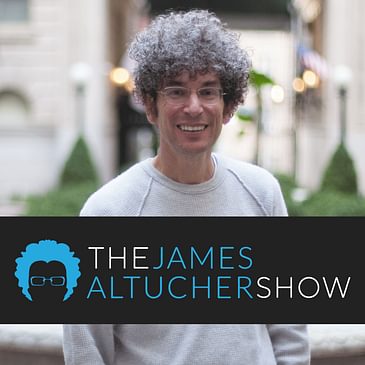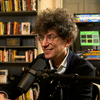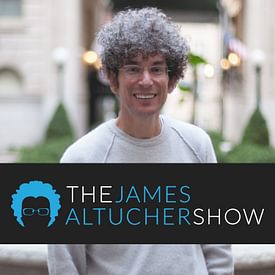We're thrilled to welcome Arthur Brooks to the show, a remarkable author whose work has significantly influenced James' recent journey. We dive deep into his inspiring books, "From Strength to Strength: Finding Success, Happiness, and Deep Purpose in the Second Half of Life" and "Build the Life You Want," co-authored with the iconic Oprah Winfrey. Our conversation is not just about the pages of these books but the profound impact Arthur's works have had on reshaping the perspectives and lives of those who read them.
Arthur's "From Strength to Strength" struck a personal chord with James last year, especially with his quest to regain and surpass his Chessmaster ranking from 25 years ago. Drawing on social science, philosophy, biography, theology, and Eastern wisdom, Brooks explains how true success in life is well within our reach. By refocusing on certain priorities and habits that anyone can learn, such as deep wisdom, detachment from empty rewards, connection & service to others, and spiritual progress, we can set ourselves up for increased happiness.
In this episode, Arthur and James explore the powerful concepts in Arthur's books, discussing how they can be applied to achieve personal and professional growth. Join us for this enlightening conversation that might change the way you think about your strengths and the path to building the life you've always wanted.
The interview with James Altucher and Arthur Brooks covers several topics, primarily focusing on changes in intelligence and success over the lifespan, and how to find happiness and meaning in life.
------------
Introduction and Arthur Brooks' Books (00:00:33 - 00:03:44): James introduces Arthur Brooks and mentions his books "From Strength to Strength" and a book co-authored with Oprah, focusing on changes in brain function with age and strategies for happiness and success.
Fluid vs. Crystallized Intelligence (00:03:44 - 00:10:06): Brooks explains the concept of fluid intelligence (quick thinking and problem-solving in youth) and crystallized intelligence (wisdom and pattern recognition in older age). He provides examples from chess, law, music, and other fields, illustrating how different stages of life favor different types of intelligence.
Career Pathways and Success Across Lifespan (00:10:06 - 00:12:20): They discuss how career trajectories should change with age, emphasizing moving from roles requiring fluid intelligence to those benefiting from crystallized intelligence, like teaching or advising.
Happiness, Wellbeing, and Success (00:12:20 - 00:22:22): Brooks talks about the difference between happiness and wellbeing, and how success should be judged at different ages. He stresses the importance of focusing on things that bring true happiness like faith, family, friendship, and service.
Spiritual and Philosophical Life (00:22:22 - 00:27:40): The conversation shifts to spiritual and philosophical aspects of life, and how these can become more important as one gets older. Brooks shares his experiences with different spiritual traditions and their teachings on suffering, happiness, and meaning.
Starting Late on the Path of Intelligence and Success (00:27:40 - 00:35:34): Brooks advises on how to start late on the path of crystallized intelligence and how to redefine success and happiness later in life.
Transcendence and Overcoming Challenges (00:35:34 - 00:42:03): They discuss strategies for overcoming life challenges, the importance of transcendence, and how to adapt one's career and personal goals as they age.
Closing Remarks and Future Projects (00:42:03 - 00:49:39): The interview concludes with Brooks talking about his future projects and the overlap of teachings in Buddhism, Hinduism, and Christianity, especially regarding suffering and its role in understanding life's meaning.
-----------
What do YOU think of the show? Head to JamesAltucherShow.com/listeners and fill out a short survey that will help us better tailor the podcast to our audience!
Are you interested in getting direct answers from James about your question on a podcast? Go to JamesAltucherShow.com/AskAltucher and send in your questions to be answered on the air!
------------
Visit Notepd.com to read our idea lists & sign up to create your own!
My new book, Skip the Line, is out! Make sure you get a copy wherever books are sold!
Join the You Should Run for President 2.0 Facebook Group, where we discuss why you should run for President.
I write about all my podcasts! Check out the full post and learn what I learned at jamesaltucher.com/podcast.
------------
Thank you so much for listening! If you like this episode, please rate, review, and subscribe to “The James Altucher Show” wherever you get your podcasts:
Follow me on Social Media:
------------
- What do YOU think of the show? Head to JamesAltucherShow.com/listeners and fill out a short survey that will help us better tailor the podcast to our audience!
- Are you interested in getting direct answers from James about your question on a podcast? Go to JamesAltucherShow.com/AskAltucher and send in your questions to be answered on the air!
------------
- Visit Notepd.com to read our idea lists & sign up to create your own!
- My new book, Skip the Line, is out! Make sure you get a copy wherever books are sold!
- Join the You Should Run for President 2.0 Facebook Group, where we discuss why you should run for President.
- I write about all my podcasts! Check out the full post and learn what I learned at jamesaltuchershow.com
------------
Thank you so much for listening! If you like this episode, please rate, review, and subscribe to “The James Altucher Show” wherever you get your podcasts:
Follow me on social media:





